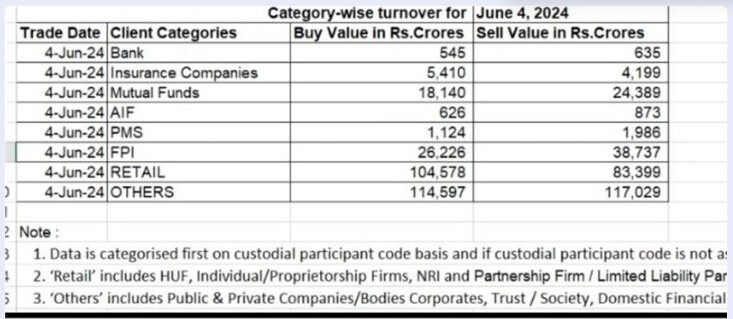I see people tweeting snapshot of catgorywise turnover of 4th June (see below) showing that retail invested ~21000 cr on that day during fall. Can anyone help on how I can check this on BSE / NSE website?
Any one has Idea about chemicals/resigns used in water treatment/ purification and which companies are pioneer in those chemicals?.
Hi VP Family,
I am a new investor and I want to know the basics of options from stock point of view. I know very basics like CE, PE , strike price, premium what I don’t know is how to select a right strike price and how to decide whether to go with OTM options or any particular strategy in options.
Thanks in advance for your kind support.
Watch YT video on the same by @Worldlywiseinvestors
To select the right strike price, consider your risk tolerance. If you like higher risk, choose out-of-the-money (OTM) options. For moderate moves, pick at-the-money (ATM) or in-the-money (ITM) options.
Think about how much you expect the stock price to move. For big moves, OTM options are good. For smaller moves, ATM or ITM options are better.
Consider how long you plan to hold the option. Longer-term options are safer but cost more. Short-term options are cheaper but riskier.
Look at market volatility. In a volatile market, ITM options might be safer.
For strategies:
-
Buying calls/puts: Easy but needs a big move in the stock price.
-
Spreads: Combine options to limit risk and cost. A bull call spread is one example.
-
Straddles/strangles: Good for volatile markets. Buy both a call and a put.
Start with buying calls or puts and try more complex strategies as you learn.
Hi,
Is there a place I can find a list of all listed companies and the city in which they are located/head-quartered?
Thanks
BSE provides the data. With HQ Location.
Which things makes a balance sheet “a strong balance sheet”?
I know debt should be low, cash should be high but what others things to look out for?
For a good business, growth, cash flow and valuations matter the most. Which things are the most important when analyzing the balance sheet ?
Could anyone suggest me article, video etc to know more about impact on stock market if government tinker LTCG, STCG or STT rate etc. What happened when it was re-introduced by BJP in 2018?, How stock market reacted?
Suggest me article, video etc on topics, Thanks.
Sir please suggest a book which teach basic of balance sheet and Each term meaning and each term relationship with other.
Book is also written in simple word which is easy to grab.
Romancing the Balance Sheet by Anil Lamba is a great book for beginner or anyone getting into finances.
The Five Rules for Successful Stock Investing by Pat Dorsey: Best book for understanding businesses
Then,
Read any 5 companies analysis from Dr Vijay Malik’s blog. This exercise will help you practice theories learnt in Pat Dorsey’s book for Indian companies.
Sir,in which platform Dr.Vijay Malik blog available.
Refer to this link
For investors using Zerodha for equities, I have recently created an automated XIRR model which accounts for all short and long-term trades. I made this for myself to better understand real returns since Zerodha doesn’t account for short-term trades in their XIRR calculations. Anyone looking to use this, please feel free to drop an email to surbhisinglaiitd1@gmail.com with subject ‘XIRR Calculator’. Happy to share with anyone interested.
Why the email? You can share it here.
And does your XIRR model incorporate all the corporate actions like dividends, buybacks, splits, bonuses?
But Zerodha is correct. Using XIRR for short term trades will artificially inflate the XIRR and make it meaningless.
Then how do we calculate the return for shorter term trades, if not the XIRR?
HFT firms, if any, using clients’ money when show their return must be using some metric, and their trades are the shortest possible duration trades.
I think for durations less than 1 year, it is better to look at absolute returns.
The thoughtful Investor- Basant Maheshwari

